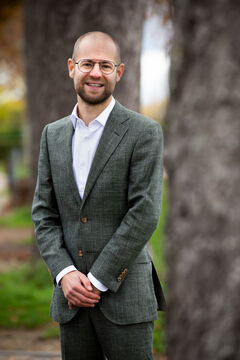Five TU/e researchers receive Veni grants
Five young researchers from TU/e have received a Veni grant from the Dutch Research Council (NWO), which will provide the researchers with a platform to explore their own research ideas for a period of three years. Sofie Haesaert, Max Birk, Roderick Tas, Loe Schlicher and Emily Sullivan will each receive a grant worth up to 250,000 euros.
The Veni grant, which is awarded by the Dutch Research Council (NWO) every year, provides early-career researchers with critical funding that allows them to build on their previous or current research endeavors. This year, TU/e’s Veni laureates will use their funding to study a wide range of subjects in several disciplines.
Measuring stress with videogames
Digital data can provide valuable information that can be used to detect changes in indicators associated with health such as cognitive performance, emotions, and behavior. However, there is a lack of appropriate protocols and methods available to researchers to properly design and validate these digital indicators of health. With his Veni grant, Max Birk plans to establish methods and protocols for digital indicators of stress using videogames. Birk is an assistant professor in the Systemic Change group based in the department of Industrial Design.
Better protection against terrorism
The research of Loe Schlicher focuses on devising methods to stop terrorists attacks as quickly as possible. Finding optimal locations of protective resources, such as rapid-response, is therefore crucial. For his Veni-funded research, he will develop new mathematical models to support these decisions, taking into account the strategic behavior of an opponent.
Schlicher is an assistant professor of Operations and Game Theory in the Operations, Planning, Accounting and Control research group at the department of Industrial Engineering & Innovation Sciences. His research focuses on Game Theory and its applications to Operations Management.
Intelligent systems learn to function safely via sensor data
Sofie Haesaert is interested in the efficient and safe design of control systems. The increasing availability of computing power and sensors has led to the digitization of cars, planes and robots, among others. To enable long-term autonomy, these intelligent systems need to be able to adapt to physical changes safely. Using her Veni grant, she aims to investigate safe learning from sensor data for these systems.
Haesaert is an assistant professor in the Control Systems group of the department of Electrical Engineering. Her research interests lie in the development of verification and control synthesis methods for cyber-physical systems.
The hidden life of antifreeze proteins
The focus of the research of Roderick Tas is on how some fish, plants, insects, and bacteria produce a variety of antifreeze proteins to survive at extremely low temperatures. With his Veni, he will use super-resolution microscopes to unravel the unknown dynamics by which these proteins inhibit ice. These results can lead to bio-inspired antifreezes to be used in biomedicine and daily life.
Tas is currently a postdoctoral researcher in the Self-Organizing Soft Matter group in the department of Chemical Engineering and Chemistry.
The scope of understanding and explanation from machine learning models
Machine learning models influence impactful decisions. However, such models are increasingly complex and opaque, challenging current philosophical theories of explanation and understanding. Using her Veni grant, Emily Sullivan plans to develop a new framework for identifying whether understanding from machine learning models is possible, and the impact these models have on theories of explanation.
Sullivan is an assistant professor in the Philosophy and Ethics group in the department of Industrial Engineering & Innovation Sciences.
Veni offers researchers who have recently obtained their PhD the opportunity to further develop their ideas over a period of three years. The subsidy amounts to a maximum of 250,000 euros. This year, 1,127 researchers applied for a Veni grant, of which 162 received funding.







Discussion